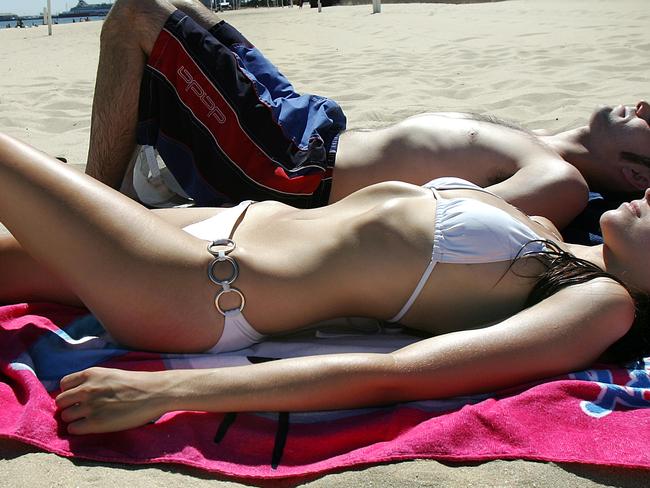Bayside suburbs of Sandringham and Black Rock are revealed as Victoria’s melanoma hot spot
Melbourne’s beach culture is having a catastrophic effect on the health of locals, with the rates of melanoma diagnosis soaring above the national average. And one expert urges men and women to slip, slop, slap differently.

Inner South
Don't miss out on the headlines from Inner South . Followed categories will be added to My News.
Shocking skin cancer data has revealed the bayside suburbs of Sandringham and Black Rock as Victoria’s melanoma hot spot.
There were a whopping 36 per cent more cases than the national average in Black Rock and Sandringham between 2010 and 2014, second to Point Nepean on the Mornington Peninsula with 29 per cent more.
The latest figures from the Cancer Council have proved a warning for beach lovers from Brighton down to Point Nepean, with skin cancer diagnosis rates topping the nation’s average in more than half of the seaside suburbs.
Bayside’s Beaumaris fared third worst at 22 per cent above average, ahead of Rosebud, McCrae, Dromana and Mornington which all sat above 10 per cent.
And one skin cancer expert is warning males to slip slop slap their backs and women to protect their lower legs.
Dr Phillip Liefman, who has run the Bayside Skin Cancer and Medical Clinic at Beaumaris for 30 years, said people who worked indoors or had family history of melanoma were more likely to get the disease.
He said spots were most likely to be found between the knees and ankles of females and on the middle and upper back of males.
“With people who work outside, the sun trickles onto their skin, rather than the assault on an indoor worker’s skin when they get out on holiday and spend weeks on the beach,” he told the Leader.
“There is a big beach culture in Bayside … we had 1000 new patients last year and pulled off several spots each week.”
More than 50,000 Aussies got a shock melanoma diagnosis between 2010-14, with the disease continuing to kill one person every five hours.
It is most common cause cancer for people aged between 15 and 39 years.
Nearly 8000 people lost their lives between 2006-14, with an average of more than 370 men compared to women each year.
“(But) if melanoma is found early, we can cure them all,” Dr Liefman said.
“Level one melanomas start in the epidermis where there are no blood vessels. There is a 100 per cent success rate if they are found in that area.”
The clinic uses the revolutionary Foto Finder machine, which keeps a photographic journal of each patient’s skin and compares the progression of moles with each appointment.
MORE NEWS
WORST DRIVERS IN THE SOUTHEAST REVEALED
BOTCHED BURGLARY CAUGHT ON CCTV
PORTSEA FAMILY PAYS $5M TO DEMOLISH HOUSE
Dr Liefman urged people to avoid being burnt and to use sunscreen all year round.
“Take an annual professional skin check and conduct your own monthly checks at home,” he said.
“If you see a new mole or an existing one feels different, hurts, itches, bleeds, ulcerates, grows, or behaves differently, book in for a check.
“The incidence of melanoma is increasing … skin is so important and you should want a special appointment for it.”

On January 18, the Sunsense Sunscreen team will hit Sandringham, Black Rock, Mordialloc and Chelsea beaches between 11am-3pm with 60,000 free sunscreen samples in hand in a bid to educate lovers of the great outdoors on the dangers of sun exposure.
They will donate $1 from every sunsense product sold towards melanoma research, clinical trials and treatment.
For more information, visit www.sunsense.com.au
